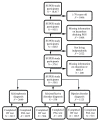Reaction Time and Visual Memory in Connection to Hazardous Drinking Polygenic Scores in Schizophrenia, Schizoaffective Disorder and Bipolar Disorder
- PMID: 34827421
- PMCID: PMC8615595
- DOI: 10.3390/brainsci11111422
Reaction Time and Visual Memory in Connection to Hazardous Drinking Polygenic Scores in Schizophrenia, Schizoaffective Disorder and Bipolar Disorder
Abstract
The purpose of this study was to explore the association of cognition with hazardous drinking Polygenic Scores (PGS) in 2649 schizophrenia, 558 schizoaffective disorder, and 1125 bipolar disorder patients in Finland. Hazardous drinking PGS was computed using the LDPred program. Participants performed two computerized tasks from the Cambridge Automated Neuropsychological Test Battery (CANTAB) on a tablet computer: the 5-choice serial reaction time task, or Reaction Time (RT) test, and the Paired Associative Learning (PAL) test. The association between hazardous drinking PGS and cognition was measured using four cognition variables. Log-linear regression was used in Reaction Time (RT) assessment, and logistic regression was used in PAL assessment. All analyses were conducted separately for males and females. After adjustment of age, age of onset, education, household pattern, and depressive symptoms, hazardous drinking PGS was not associated with reaction time or visual memory in male or female patients with schizophrenia, schizoaffective, and bipolar disorder.
Keywords: PGS; bipolar disorder; cognition; hazardous drinking; reaction time; schizoaffective disorder; schizophrenia; visual memory.
Conflict of interest statement
The authors declare no conflict of interest.
Figures
References
-
- Sanchez-Roige S., Palmer A.A., Fontanillas P., Elson S.L., Adams M.J., Howard D.M., Edenberg H.J., Davies G., Crist R.C., Deary I.J., et al. Genome-Wide Association Study Meta-Analysis of the Alcohol Use Disorders Identification Test (AUDIT) in Two Population-Based Cohorts. Am. J. Psychiatry. 2019;176:107–118. doi: 10.1176/appi.ajp.2018.18040369. - DOI - PMC - PubMed
-
- Meyers J.L., Chorlian D.B., Johnson E.C., Pandey A.K., Kamarajan C., Salvatore J.E., Aliev F., Subbie-Saenz de Viteri S., Zhang J., Chao M., et al. Association of Polygenic Liability for Alcohol Dependence and EEG Con-nectivity in Adolescence and Young Adulthood. Brain Sci. 2019;9:280. doi: 10.3390/brainsci9100280. - DOI - PMC - PubMed
-
- Clarke T.K., Smith A.H., Gelernter J., Kranzler H.R., Farrer L.A., Hall L.S., Fernandez-Pujals A.M., MacIntyre D.J., Smith B.H., Hocking L.J., et al. Polygenic risk for alcohol dependence associates with alcohol consumption, cognitive function and social deprivation in a population-based cohort. Addict. Biol. 2016;21:469–480. doi: 10.1111/adb.12245. - DOI - PMC - PubMed
Grants and funding
- 6045290-5500000710 and 6000009-5500000710/The Stanley Center for Psychiatric Research, Broad Institute, Cambridge, MA, USA
- 713606/The H2020 Marie Skłodowska-Curie Actions co-funding of regional, national, and international pro-grams (COFUND)
- 0400 584622/The the Iso-Mällisen Foundation (Iso-Mällisen Säätiö)
LinkOut - more resources
Full Text Sources


